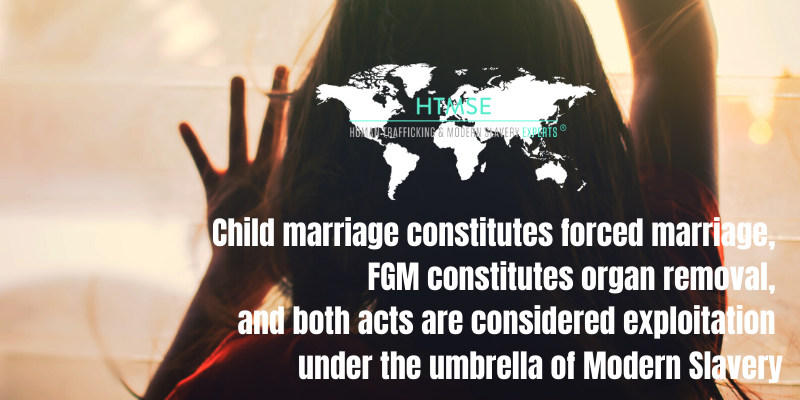
By exacerbating existing vulnerabilities and subjecting more potential victims into vulnerable status, Coronavirus has uprooted much progress made towards protecting women’s rights around the world. The United Nations Population Fund (UNFPA) deems 19 medical practices rooted in gender inequality a violation of human rights, including practices such as breast ironing and virginity testing. Their 2020 report Against My Will focuses on female genital mutilation (FGM), child marriage and extreme bias against daughters in favour of sons as three widespread practices that constitute a “silent and endemic crisis“. These acts involve exploitation and fall under the umbrella modern slavery or violate fundamental human rights of female victims. Furthermore, the COVID-19 pandemic has led to an exponential increase in gender based violence and the breakdown of critical sexual health services which deprive women of their reproductive health rights.
FGM
FGM involves surgical manipulation of a girls body in a way that diminishes their ability to achieve equal rights as men. It is a targeted act to subjugate and control a woman’s sexuality, thereby violating their right to equality and exposing them to extreme health risks. Despite most countries in the world deeming the practice illegal, FGM is rooted in the choice of a girls family or community, and goes ahead within this private sphere often without the knowledge of the state. This means it usually takes place in unsterile, black market conditions posing higher risk of infection and other complications such as haemorrhage, sepsis and even death. Mental and physiological repercussions include depression, irreversible loss of sexual pleasure and potentially sexual function. UN treaty bodies and international health organisations reject medicalisation of FGM to achieve safer sterile conditions because it would make the health professionals complicit in human rights violations. The UNFPA estimates the Coronavirus led disruption to preventative programs will lead to 2 million more cases of FGM between 2020 – 2030.
Child Marriage
Rates of child marriage have begun to rise as a result of the delay to preventative programs and the extreme economic hardship that vulnerable families are are experiencing as a result of the pandemic. UNFPA predicts an additional 13 million child marriages between 2020 – 2030 that could have been prevented by intervention services disrupted by the pandemic. Deepening poverty incentivises parents to marry off their daughters at a young age, to avoid the cost of their living. Although most countries follow the international Child Rights Convention and thereby establish a minimum age of consent between 16 and 21, the majority of countries allow parental consent to override age restrictions of their children to marry. Governments have a duty to end the harm to children, whereby effective laws need to be supported by economic and social restructuring to promote the equal rights and opportunities of vulnerable girls.
Sex Selection & Reproductive Health Rights
A preference for boy babies over girl babies leads to prenatal sex selection in favour of boys, or girl babies being neglected in infancy. 140 million females are ‘missing’ in the world population due to extreme bias against daughters in favour of sons, most significantly in China and India. Whilst in some cases this results in direct physical harm to baby girls, this mentality of systemic gender bias manifests in the ongoing issues of female subjugation later in their lives, such as through child marriage or domestic violence. During the Coronavirus pandemic, there are restricted means to regulate such abuses. Due to overrun health systems, women’s reproductive health rights and sexual health are being neglected in both contexts of the developing world and developed world. The distribution of contraceptives have been severely disrupted due to supply chain issues. UNFPA assessed service disruptions in minimum lockdown cases (of three months) predicting 13 million women being unable to access contraception, leading to 325,000 unintended pregnancies. Malta, for example, has recorded 12 unintended pregnancies per day since lockdown. This in turn, will increase cases of neglect and murder of baby girls, due to an inability to access abortion practices during the pandemic.
Coronavirus lockdown: Gender based violence
Coronavirus lockdown posed an unprecedented necessity for families to stay indoors, that has led to increased gender based domestic violence and exploitation. Crisis centres, justice officials and domestic violence hotlines received increased reports during the lockdown period, indicating an increase in total acts of violence, whilst women and girls were forced to stay indoors with their abusers. Increased stresses caused by the pandemic has, and will continue to exacerbate tensions between families, causing violent outbreaks. Furthermore rates of abuse have increased due to disruptions to support programs such as open victim shelters, safe houses and intervention services. UNFPA predicts six months of lockdown would result in up to 31 million additional cases of gender based violence.
2030 Target
Statistics provided by UNFPA along with partners Avenir Health, Johns Hopkins University (USA) and Victoria University (Australia) estimates the vast human cost of the pandemic in relation to the rights and health of women and girls. The report includes targets for 2030 to gain back the global progress disrupted by Coronavirus, including: keeping girls in school for as long as possible, engaging men and boys in social change, and investment of $3.4 billion per year dedicated to ending FGM and child marriage. This will alleviate the suffering of approximately 84 million young females over the next decade. Along with the necessity for legal obligations around women’s rights and equality, UNFPA stresses the need for a social and cultural shift to prevent these harmful practices going ahead. Raising awareness within communities, empowering women through education and economic opportunities, and providing effective protective services to vulnerable women are essential to addressing this “silent and endemic crisis”, brought about by the Coronavirus pandemic.